What do you think?
Rate this book


175 pages, Paperback
First published March 15, 1993
By 1871 Europe had been without news of the explorer for three years. Some of his porters, returning prematurely to the coast, had spread rumors of his death. But the Europeans were not wholly convinced.
As it happened, Livingstone was not “lost”; he knew exactly where he was, and he had excellent guides with him, namely Susies, Chuma, and Jacob Wainwright, who had accompanied him for years. But he was of necessity heavily reliant on the Arab [slave] traders who regularly plied the route between Ujiji and the coast, and his strong opposition to the slave traffic did little to win him the sympathies of those who were engaged in it. The Arab traders were not in the least anxious to help him maintain his contacts with Europe, and they balked at acting as his messengers.
It was Great Britain that first turned toward Africa with new eyes. When it came to fighting the slave trade and exploring the continent, the British were the real pioneers.
At the end of the 18th century, leaders of the Christian world rather belatedly decided that the slave trade was inconsistent with its aspirations and teachings, whereupon a number of missionaries once again set out for the African unknown to spread the gospel.
This decision [“that the slave trade should be abolished”] was largely based on philosophical grounds, even though learned Europeans remained for the most part deeply ignorant of African societies. Seeking to promote “civilization” and happiness on the continent, many ignored the individual characters of African cultures. Even the Scottish missionary David Livingstone, who was little given to disparaging the Africans, betrayed a well-meaning condescension when he wrote that his object was to help the people of Africa to “take a place among the nations of the Earth.”
This patronizing attitude was based on the undoubted, and recent, technological advances of the Western world, in which Europeans quickly saw an indication of their own moral superiority.
He [Livingstone] undoubtedly paid the Africans great respect, yet his vision was still colored by his belief in the superiority of the white man, a superiority he regarded not as innate, but the result of education and the influence of Christianity… he devoted himself wholly to the Africans he had come to “save,” and to the Europeans whom he encouraged to carry on his mission.